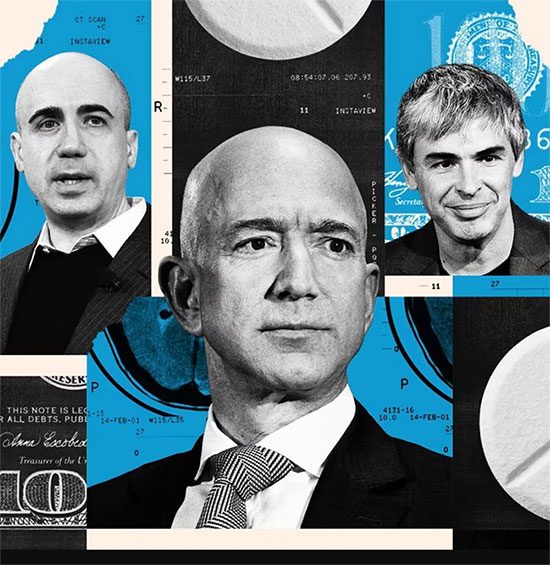Breakthrough advancements in anti-aging and cellular longevity are making the “elixir of life” industry increasingly vibrant.
When Nir Barzilai became an expert in the field of anti-aging 30 years ago, the industry was merely a distant hope for scientists.
However, today, more billionaires are investing in this sector as numerous groundbreaking studies emerge, potentially turning tech giants like Jeff Bezos, Larry Page, and Sergey Brin into “Immortals.”
“We have moved beyond dreaming. It is time to realize commitments,” remarked Barzilai, director of the Institute for Aging Research at Albert Einstein College of Medicine.
This expert is conducting a pioneering trial with Metformin, a drug used for treating diabetes, to see if it can extend lifespan after optimistic research results on actual patients in the UK.
If Metformin is recognized by regulatory bodies for its anti-aging properties, Barzilai believes that numerous pharmaceutical and biotechnology giants will jump into this field.
“If validated, I think this will be a seismic shift for the entire world,” Barzilai commented.

The anti-aging industry is heating up.
The Elixir of Life
The Financial Times (FT) states that humanity’s quest for the elixir of life has spanned centuries, from the invention of vaccines and the creation of medicinal drugs to dietary supplements and lifestyle methods aimed at prolonging life.
However, currently, biotech companies are hesitant to promise “immortality” for their research projects. Most of these endeavors aim to increase healthy lifespan rather than provide eternal life. The primary goal is to alleviate the high costs associated with aging populations and enhance productivity throughout the working lifespan.
Barzilai has already raised $22 million, including $9 million from the U.S. National Institutes of Health (NIH), and is actively seeking an additional $50-75 million for the 4-6 year project.
According to Barzilai, securing funding for a project without groundbreaking results is challenging, as companies prioritize immediate profits while governments favor projects addressing infectious diseases.
In practice, the main funders in this sector are technology billionaires, such as Amazon founder Jeff Bezos and Google’s Larry Page and Sergey Brin, who have invested in anti-aging projects.
These investors have the financial capacity to forgo immediate profits in pursuit of immortality.
In 2021, the anti-aging project Altos Labs, led by former National Cancer Institute (NCI) director Rick Klausner, raised up to $3 billion, with notable investors including Jeff Bezos.
Meanwhile, Google co-founders Sergey Brin and Larry Page have also invested billions in Calico’s research. According to FT, Alphabet (Google) has now committed an additional $3.5 billion to this project.

Major sponsors in this sector come from tech billionaires.
Similarly, famed investor Peter Thiel is backing research by Unity Biotechnology, a pharmaceutical company that went public on Nasdaq in 2018.
Of course, receiving investment from billionaires raises controversy, as success could lead to greater societal inequality.
“If you are rich, the longer you live, the richer you become, and your influence grows, while the poor may never access the elixir of life,” commented Christopher Wareham, an expert at Utrecht University.
What is Death?
During research, scientists continually question what aging is. In 2013, a group of researchers identified nine signs of aging and argued that both genetic codes and biochemical systems in the body lead to functional decline and mortality.
CEO Eric Verdin of the Buck Institute for Research on Aging (BIRA) in California stated that now, instead of only asking basic questions or passively accepting aging, many projects have begun to actively change these processes.
Scientific perspectives have significantly evolved as aging is no longer seen as a natural process but as a factor causing diseases and decreased productivity.
“The leading cause of disease globally is not obesity or smoking, but aging,” Verdin noted.
In agreement, CEO James Peyer of Cambrian Biopharma stated that researchers are striving to develop new generation drugs that can combat aging with safety comparable to that of vaccines or antibiotics.
One of the groundbreaking advancements in the “elixir of life” sector is the ability to reverse the biological clock of body cells using Rejuvenation Factors, which not only rejuvenate cells but also reverse other disease processes.

The average lifespan of the UK population has doubled from 1841 to 2011.
Additionally, scientists are seeking solutions to the accumulation of “aged” cells in older adults. These cells do not divide but also do not die, persisting indefinitely and being one of the main causes of health issues.
Research from the Mayo Clinic in the U.S. on mice shows that allowing these “aged” cells to die rather than persist can lead to healthier living individuals that survive 20-30% longer than normal mice.
Nonetheless, these projects have only been tested on animals, and producing an “elixir of life” for humans is still a long way off.
While experiments on mice may yield quick results, scientists cannot wait several human lifetimes to determine whether the drugs tested on humans are effective or what genetic side effects they may cause.
Moreover, there are current laws and regulations, as no country recognizes “aging” as a disease-causing factor, and if it is deemed a “drug”, it must treat a specific disease to be produced legally.
Due to the lack of precedents, if successful research occurs, the “elixir of life” would face numerous challenges to reach the market.
Returning to Barzilai’s Metformin, although research shows this drug may extend lifespan, when working with regulatory agencies in the UK, the drug’s purpose would be to treat strokes, heart failure, cancer, dementia, etc., if it wants to pass through the approval process.


















































